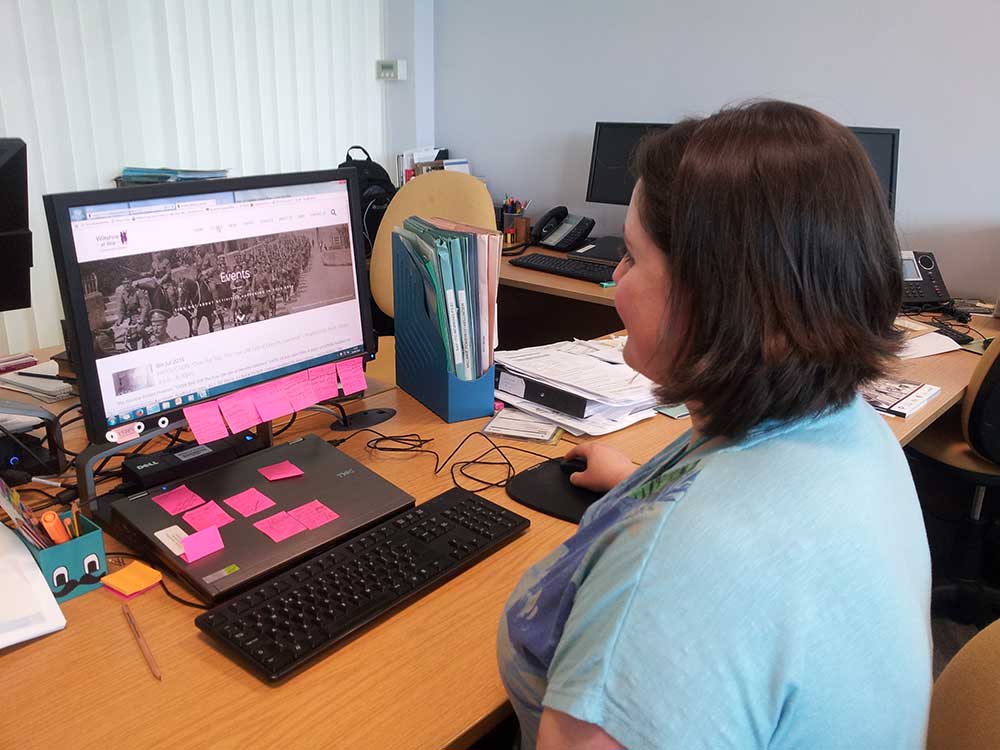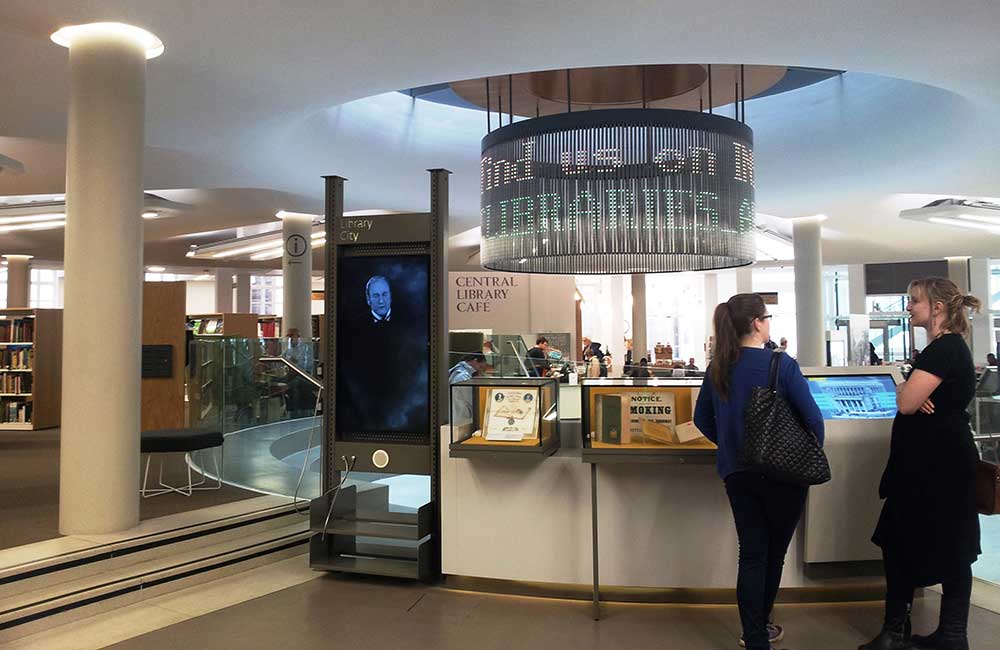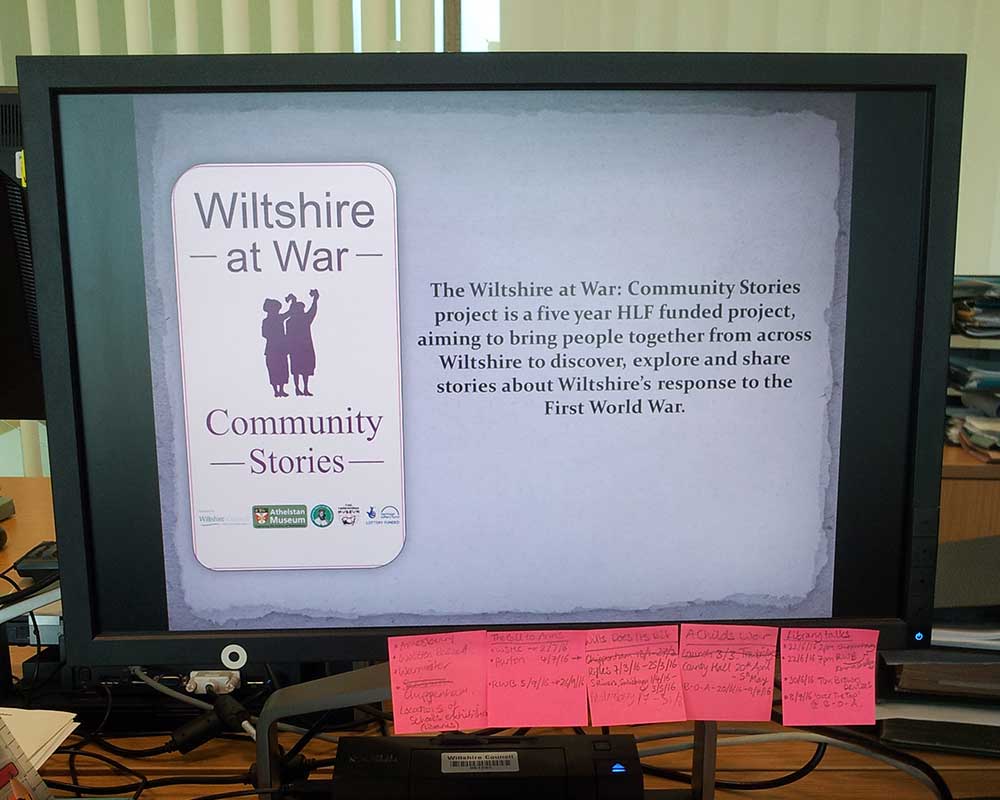I have been in my post as Transforming Archives Trainee based at the Wiltshire and Swindon History Centre (WSHC) for almost eight months now. The focus of my traineeship is outreach and engagement, with collections development.
I come from a working background in mainly retail and customer service, and hold an undergraduate degree in history. I was absolutely thrilled when I saw the advert for the traineeship. It seemed like the perfect way to get my foot in the door of the heritage sector, put my love of history to good use, and see if working with archives and records is what I would like to pursue a career in. Well I can honestly say that I have enjoyed every part of it!

Working at my desk
WSHC is a wonderful place to work, and I felt welcomed as part of the team as soon as I started. I’ve had a good amount of in-house training in a variety of topics. I’ve enjoyed sessions learning about different types of records held in the archives – what they are, where to find them, and how to use them. I’ve had training in web editing using WordPress and Joomla, photograph editing using Photoshop, and using social media for the history centre. I have also had document-handling training, and an introduction to palaeography (reading old handwriting). I’ve learned how to conduct an oral history interview, and had sessions on volunteer management and community engagement.
The main project that I have been working on is Wiltshire at War: Community Stories, a Heritage Lottery Fund (HLF) funded First World War centenary project. The project has five main streams: community engagement to gather stories about Wiltshire and the First World War; the production of five separately themed exhibitions and an additional schools exhibition; learning resources for schools; a series of library talks with accompanying book displays; and a website as a place to collate stories and showcase the project. My involvement has been:
- creating a database of the stories and images collected
- liaising with members of the public as well as museums, heritage centres and community groups to gather stories
- helping with content for two of the exhibitions
- formatting, (occasionally writing) and uploading stories onto the website
- updating the website with news and event pages, and posting on external event websites
- running the social media for the project (www.twitter.com/wiltshireatwar)
- answering website comments and emails
- creating spreadsheets to monitor social media and website engagement, and communications to the project
I’ve also given a presentation to the Wiltshire Museums Group, promoting the project and encouraging them to get involved, and I’ve helped facilitate one of the library talks. In the coming months I will be involved with more community engagement activities for the project.
A small amount of my time has been spent looking at the Lacock Unlocked community archive. Lacock Unlocked was a HLF funded project that saved the archive of Lacock Abbey and its estate, and made the historically significant collection accessible to the public. Part of this project involved creating an online community archive where Lacock residents can upload their images. I have been compiling a spreadsheet to record whether there is any vital information missing from the descriptions of each image, such as names, dates and locations. The idea is that we will go back to the residents and see if we can gather the missing data. I’ve also written three blogs on different subjects for the WSHC website, with another due in August.
Over the next few months I will be diving into the archives finding relevant records to help the History Centre’s involvement in the Know Your Place West of England project. The project aims to build a free online research tool to map community heritage, combining historic maps and collections. I will be locating relevant documents, digitising them, and adding a few written paragraphs to give some context for an exhibition. I also have a small project coming up cataloguing oral history interviews using CALM, as well as a data conversion project.
An aspect of the traineeship that I was pleasantly surprised with was completing an undergraduate course with the University of Dundee’s Centre for Archives and Information Studies in Outreach and Education. Having been out of academia for some time I was slightly apprehensive about studying, writing essays, and learning how to write reports. It was challenging to balance work with studying, but I found the course thought-provoking, rewarding, and invaluable for my continuing professional development.
A truly excellent part of this traineeship is the £1000 training budget we are given to undertake relevant outside training to enhance our learning. I have been lucky enough to use this budget to learn about a wide variety of topics, including but not limited to digital preservation, digitisation, outreach, education, oral history, palaeography, copyright, archival arrangement and description, records management, and project management. All the trainees have also had free extra training at the two ‘base camps’, hosted by the National Archives, then the Scottish Council on Archives, as well as an English cohort visit to Archives+ in Manchester. This really has been a once in a lifetime opportunity.

Archives+ in Manchester
On to the future
Along with other trainees, I will be presenting a poster at the ARA Conference 2016, showcasing myself and the traineeship. I am really looking forward to this, I think it’s a wonderful opportunity to put ourselves out there and network in the sector.
The past eight months have been challenging and rewarding, and I am so grateful for my time here. I have gained soft skills and hard skills, have loved every minute, and I am determined to continue working in the sector. I’d like to keep learning about preserving records in a way that makes them, accessible, engaging and exciting for all. My aim is to find paid work initially, with a view to go on and study a postgraduate course in the future.
